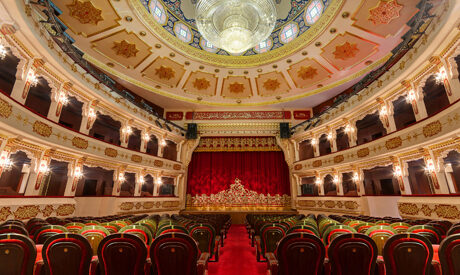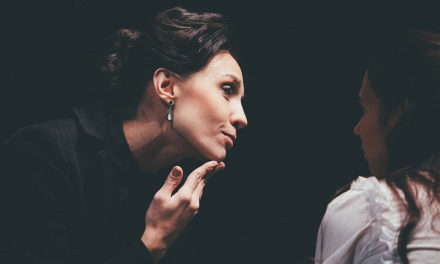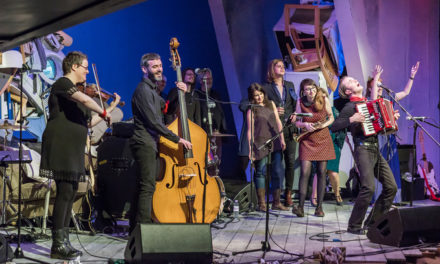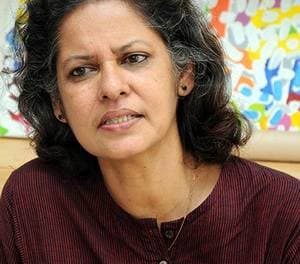This year, for theatre and dance artists around the world, it was necessary to convey the message that culture contributes to human immunity.
The year will remain a turning point in the global history of theatre and performance. Where many differences had separated the various stages of the world, Covid-19 managed to unite them under the banner of danger. The danger of infection and of death dictated the rules to open or close cultural venues and to impose a partial or full lockdown. The pandemic infiltrated every zone of physical communication, impacting all performance activities, and restricting public gatherings. This will be remembered as the year when we discovered that to survive we must transform. Although a clear fact throughout human history, transformation became a new realization, a new practice being developed on a daily basis.
For theatre and dance artists around the world, it was necessary to convey the message that culture contributes to human immunity, that there must be innovative ways of holding onto it so as to maintain the essence of our humanness. The struggle to hold onto that humanness became a central point in many artistic expressions around the world. On the Egyptian performance scene the debates around what theatre is, how to deal with online solutions as an alternative to physical attendance, and how to handle physical restrictions, were at the center of public statements and discussions.
Like their counterparts in many countries around the world, Egypt’s state-owned theatre venues closed for a partial lockdown before reopening with new rules of spectatorship: a minimum distance between spectators, universal face masks, and disinfectants. The capacity of theatre venues shrank drastically, but artists were happy to resume their work. In addition to those transformations in the rules of spectatorship within indoor performance venues, Minister of Culture Ines Abdel-Dayem paid special attention to outdoor performance spaces where natural and continuous ventilation afforded greater safety. The outdoor performance space in front of Hanager Arts Centre became a vital spot. Cairo’s summery weather, which lasts into October, made it possible to hold a vibrant program there. The feeling of outdoor performances on the Cairo Opera premises brought back a nostalgic sensation of gatherings, along with the desire to celebrate, something that could seem quite contradictory with the pandemic’s mood of insecurity and fear of others.
Yet we should not forget that downtown Cairo was always the heart of gatherings and celebrations, as it represented the Egyptian image of togetherness during the revolution of 25 January 2011. This image had remained rooted in the collective memory of gatherings and public expression. Creating outdoor performances once again in 2020 seemed like a return to that breath of life, especially since it came right after the removal of the partial lockdown as if it was a symbolic way of healing and mending a togetherness fragmented by the pandemic.
In 2020 we lost many artistic figures, among them The Playwright. If anybody earned the title, it would be Lenin Al-Ramli. Al-Ramli never gave in to commercial values in theatre, even when he was on top of his game and the number one playwright in the Egyptian theatre. He always stood by his political and social values, though not creating a naive theatre of direct messages but a theatre where issues of oppression were discussed and laughed at. An Egyptian master when it comes to comedy, and a world master when it comes to political comedy in particular, he created his own directorial version of his acclaimed play Bel-Araby Al-Faseeh (In Classical Arabic), and continued to invest in new generations of actors while many of his better-funded colleagues did not bother to recognize new talents.
Al-Ramli spent his personal earnings to produce plays that might very well not bring any money back in. His profit was a mental, not a monetary one. The winner of the prestigious international Prince Claus Award (Netherlands), he never took pride in any of his achievements. He dealt with his whole career as work, a duty and responsibility towards the society and the theatre to which he belonged. Al-Ramli will always remain as an icon of socio-political comedy in Egyptian stage history, a powerful inspiration for future generations, even if our cultural scene has a tendency to quickly forget.
This year Arab theatre lost an iconic figure in Morocco and across the whole Arab region: Hassan Al-Menei. A pioneer and an innovative scholar, a thinker who embraced tradition and inspired progress, following theatrical trends across the Arab region almost on a daily basis, Al-Menei earned the title Dean of Moroccan Criticism, which reflected a strong reputation over a period of 50 years while embracing all forms of art within his writings. His work can be seen as foundational in understanding the transformations of the art scene in Morocco from the 1960s and until 2020.
He was a unique model in being able to communicate his complex scholarly views and transmit his texts while remaining down to earth and humble to an unimaginable extent. An educator, a mediator, a critic and a passionate lover of the stage, Al-Menei will remain a powerful reference to understand the histories and transformations of the Moroccan and Arab theatre.
And, speaking of transformations, it would be impossible not to mention one particular production: Harem of Fire (Harem Al-Nar), which presented a clear feminist discourse that transformed the stage of Taliaa Theatre this year. Written by Al-Shazli Farah and directed by Mohamed Mekki, Harem of Fire offered the kind of good acting that we had badly missed in state theatre. It was acting of style and of authenticity. Abeer Lotfi exceeded all expectations portraying the sister who has a profound grudge against her older sister, the latter being the bride-to-be. Lotfi could easily have used a traditional superficial style of acting through which women wish death on other women in order to win the desired man. She could have employed the clichés and stereotypes of the jealous woman. She could have just recycled a whole tradition of female acting and evil female characters, but she made the very difficult choice — a choice only available to actresses with a unique vision and a feminist voice.
Lotfi chose to stand by her character all the way — not to judge her, not to apply society’s prejudice against her, not to present her as inhuman, a mask, but rather as an entirely normal and good woman who is forced by an oppressive patriarchal pedagogy delivered by her own mother to despise her own gender and desires, culminating in hate of her elder sister as an extended form of self-hatred. The assumed ugly sister did not end here as an evil character, she expanded and became a flagrant model of the female self-hatred produced by this oppressive system. She ended up being the core of the feminist discourse in this production while relying on a powerful history of stage acting and directing that explains how she had the courage of “being” instead of “pretending,” how she had the stage power of “vulnerability” instead of the stage vice of “social hypocrisy.”
Lotfi screamed and cried and jumped and trembled onstage as if she was reclaiming a whole history of female acting that was as much repressed and manipulated as the character that she was playing. The journey of the actress here met the journey of the repressed and instrumentalized feminist voice. Nesrine Youssef played the youngest sister who was crazy enough to seduce the future husband of her elder sister and attract him to her bed: a character that stood on the opposite side of Lotfi’s, only because she had the power to execute her desire. A kind of confrontation here was also insinuated between two opposite ways of reclaiming sexuality: screaming it out or directly taking hold of one’s own sexual rights.
One moment remains truly unforgettable: when the younger, free sister admits she has had the man in her bed. Youssef does it with full dignity and entitlement, without the usual moral hypocrisy of an apologetic acting style. This was a real and concrete triumph for the discourse of freedom on the Egyptian stage because this acting style removed the traditional shame from female sexuality and recognized the female’s ownership of her body as well as the integrity and autonomy of the female acting voice beyond the theatrical traditions of hypocrisy, shaming and patriarchal stereotyping.
The restrictions imposed by the pandemic in 2020 extended to international travel, which impacted all international theatre festivals around the world. While this brought us to an appreciation of the mobility we had enjoyed, it also brought us to a re-examination of the power of the physical encounter between theatre-makers and audiences across the world. Almost all international theatre festivals either had to postpone their current round to 2021 or replace it with an online or digital encounter. The Cairo International Festival for Experimental Theatre (CIFET) opted for a hybrid round where the international performances and competitions were replaced by digital and online encounters, while Egyptian performances took place physically under the required measures. Although debates, even conflict about online performances rage on, it was impossible to hold the festival with physical attendance from international guests and performances in September because this had to be agreed and finalized in March and April by the latest, during which time the whole world was experiencing restricted travel and mobility.
The timing of the lockdown and travel restrictions caused by the pandemic made it impossible to bring international performances physically to Cairo. On the other hand, it seemed impossible to cancel this year’s edition while almost all international theatre festivals presented an online alternative. Hybridity seemed the ideal choice. The Egyptian spectators could still enjoy their mobility and physically attend Egyptian performances, and international audiences and artists could still interact and participate via online tools.
CIFET included three competitions: filmed performances, lockdown theatre, and Egyptian live performances (the latter carrying the name of Hassan Attia). The Egyptian competition jury was headed by Hoda Wasfi, and the first prize went to The Rose and the Crown (by the Higher Institute of Theatrical Arts) while the second went to Key to Celebrity (by Al-Leaba Independent Theatre Group). It was an important moment to witness this additional form of transformation within the Egyptian theatre scene: not only are we going for hybridity in times of crisis and cultural mutation, we are also promoting emerging theatre artists and empowering their creative production by acknowledging their excellence in the framework of such a prestigious and international theatre festival.
It seemed like an iconic moment as well, since it was Wasfi who could be seen handing out those prizes as head of the jury. Wasfi is the best-known advocate of innovation in theatre, something she fervently practiced during her leadership of the Hanager Arts Centre at the time of the golden age of the independent theatre movement. This time, in 2020, during the pandemic, it was extremely significant to celebrate both the emerging artists of the Higher Institute of Theatrical Arts (directed by Ibrahim Ashraf) and the new generation of independent theatre-makers (represented by the director Doaa Hamza). It was almost a celebration of new life, re-birth, rather than crisis and mortality.
It was a recognition of the potential of progress in the Egyptian theatre scene, a statement of possibility. A unique aspect of this production, Key to Celebrity, was its panoramic view of famous Egyptian movies, especially the roles of heroes and heroines which the stunts dream of incarnating. The moments of playing those fictional characters as glimpses of movie scenes inside the play can be viewed as a kind of theatrical archiving of those movies and the kind of heroic figures they present. In spite of their comic flavor, those scattered archival moments revive our sense of the love of acting, and they help us to reconnect with our artistic history and the social and cultural stations related to it. Nevertheless, the duet does not compromise the performance’s message, intended as a kind of criticism of power dynamics within the artistic field, and a tribute to all those invisible artists who exist in all the artistic disciplines and who never receive their well-earned respect and recognition.
During this year’s hybrid edition of the CIFET, an international conference was held under the title “The Performing Arts Now: Necessity?” It was a one-day online conference that brought together artists and scholars from Denmark, Italy, Germany, Lebanon, Kenya, Canada, Korea, Morocco, and Egypt. The conference addressed the diverse performance formats that were created during the pandemic in order to respond to the variable conditions required for preserving life, while confirming the continuation of communication and interaction, if only virtually, as being the closest alternatives to a physical encounter. In this sense, the online conference was an opportunity to extend bridges of communication and exchange among performing arts practitioners and scholars across the globe.
It was an opportunity to expand the meeting beyond the restricted physical space of a conference room and create a powerful network of immediacy and urgency on a transnational level. This opportunity emerged thanks to the restrictions of travel and public gatherings. It was an opportunity born out of restriction, an openness produced by obstruction.
CIFET’s 2020 round paid tribute to the unique actor, theatre director, and professor Sanaa Shafei who also passed away in 2020. Shafei had a strong artistic following within the theatre practice and within educational and scholarly circles. Somehow, the first prize going to the Higher Institute of Theatrical Arts looked like a tribute to the teachings and inspiration of Shafei as seen in his students.
Another tribute went to Attia, to whom the main competition of the festival was dedicated. Attia was a model of theatre criticism that combines academic depth with accessibility and balances powerful scholarly studies against direct involvement in the theatre scene via advocacy and empowerment. Attia was a unique mind, a critical pedagogue, a creative spirit who transcended his generation and the traditional framework of conventional art criticism. He was an innovator, a strong believer in the new generation, and the power of change. The departure of Attia and Al-Menei in the same year will definitely leave a wound in the body of theatre academia and criticism in the Arab region, our only consolation being that they indeed supported and nourished a generation of artists and scholars who will carry forward a legacy of creativity and innovation. It is what we need now in order to survive and thrive: to transform, via critical discourse, the danger of mortality into an opportunity of re-birth, and fear into creativity.
*A version of this article appears in print in the 24 December, 2020 edition of Al-Ahram Weekly
This article was originally published by Ahram Online (http://english.ahram.org.eg/Index.aspx). Reposted with permission. Read the original article.
This post was written by the author in their personal capacity.The opinions expressed in this article are the author’s own and do not reflect the view of The Theatre Times, their staff or collaborators.
This post was written by Nora Amin.
The views expressed here belong to the author and do not necessarily reflect our views and opinions.


















